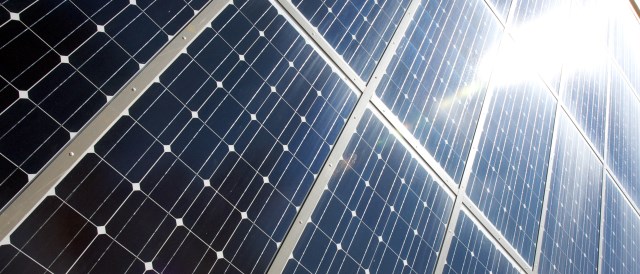The EU and China have settled their trade dispute over PV imports. Craig Morris says the deal will mainly make people outside the sector happy.

Reason for the dispute: Chinese solar panels have been undercutting the European competition while being accused of price dumping. (Photo by Mike Baker, CC BY-NC-SA 2.0)
First, the facts: China will not be able to sell panels at less than 0.56 euros per watt (0.74 USD) within the EU. Anything sold below that level will have a 47.6% duty imposed starting August 6. Furthermore, China is to export no more than 7 gigawatts of PV annually to the EU.
Now here’s the silly part – Chinese panels sold for 57 cents last week on spot markets, according to Photon’s weekly overview, compared to 63 cents for polysilicon panels from the EU. For the new deal to have any effect, the price of panels from the EU will thus have to drop another 10 percent, while Chinese prices can stay where they are; merely the margins for Chinese manufacturers will widen.
The 7 GW limit is also toothless. EPIA (PDF) has the EU’s photovoltaic market growing from only 9.7 GW this year to 12.8 in 2017 in its business-as-usual scenario. Photon cites a Deutsche Bank expert putting the figure for 2013 at around 10 GW. So the Chinese will be able to make up most of European sales for the near future.
China continues to investigate various EU products in retaliation, from related things such as raw polysilicon to seemingly unrelated things (until we remember that France voted in favor of import duties), such as wine. The EU now hopes to reach an amicable solution with China to avoid import duties against its own exports, solar and other, to the Chinese.
Was it worth the fuss? SolarWorld, the German PV giant that instigated the case in the US and the EU, is still a penny stock and still in trouble. It remains to be seen whether the firm will survive; the EU’s deal with China will not make a big difference, but such manufacturers at least stand to benefit from protection.
The situation is different for other firms in the PV sector, such as installers and developers – not to mention investors and consumers. They fear rising prices and market insecurity. Hopefully, this toothless settlement will soon calm their fears and provide planability.
The main ones to benefit are exporters not related to PV. The New York Times says BASF is happy that a deal was reached, and the same can probably be said for all German industry outside the PV sector (including wind). Germany’s trade surplus overall was the second highest since 1950 last year. In fact, Germany only had a trade deficit of around 10.5 billion euros with China last year – compared to US’s $315 billion trade deficit with China.
Unlike France, Germany did not officially support the EU’s investigation of Chinese PV products, not because the charges are unfounded, but because Germany actually competes well with China and is an export economy. The French, in contrast, openly speak of ecological patriotism.
In the end, it’s all about Realpolitik; if China is competing unfairly, what is the most effective response? Germany’s trade surplus may be an indication of how to get things done, and you might be surprised to hear how unsentimental even German solar supporters are about their own sector. Back in 2009, the German Solar Society (DGS) had no appetite for ecological patriotism: “German manufacturers have to compete with quality, longer warranties, and better service.” Now, at least the rules of the game are clear again, even if some still find them unfair.
Craig Morris (@PPchef) is the lead author of German Energy Transition. He directs Petite Planète and is writes every workday for Renewables International.